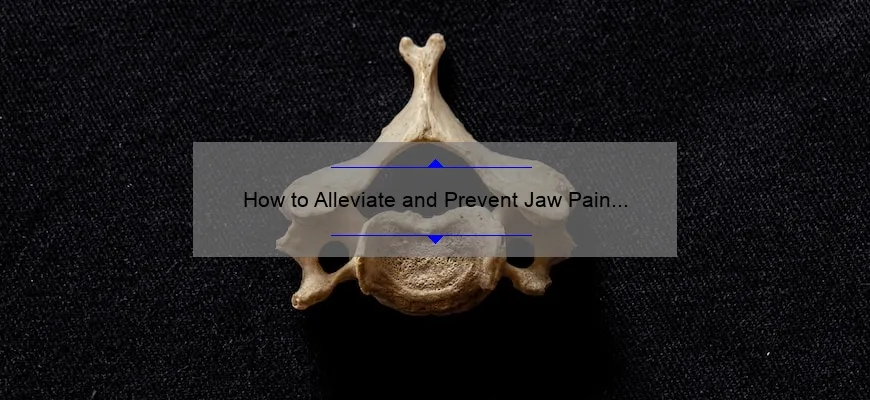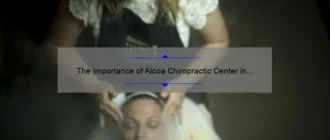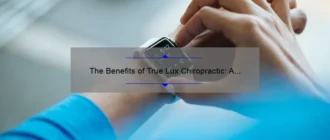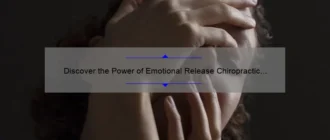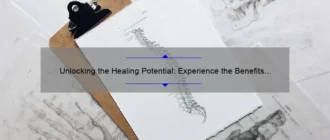Jaw pain after chiropractic adjustment refers to discomfort experienced in the jaw area following spinal manipulative therapy. Although rare, this side effect may occur due to the close anatomical connection between the jaw and upper cervical spine. Patients experiencing such pain should consult their chiropractor to rule out any underlying conditions and discuss appropriate treatment options.
Why Am I Experiencing Jaw Pain After a Chiropractic Adjustment?
There could be several reasons why you may be experiencing jaw pain after a chiropractic adjustment. It’s important to note that any side effects or discomfort following a chiropractic adjustment are typically temporary and should resolve on their own. Here are some possible explanations for your jaw pain:
1. Jaw Misalignment: Chiropractic adjustments primarily focus on realigning the spine and musculoskeletal system. However, the jaw joint (temporomandibular joint or TMJ) is connected to the skull and neck, so adjusting the neck or upper spine can potentially affect the jaw alignment.
2. Muscle Tension: The jaw is surrounded by several muscles, and any tension or tightness in these muscles can cause pain or discomfort. Chiropractic adjustments may sometimes aggravate or temporarily exacerbate muscle tension in the jaw area, leading to pain post-adjustment.
3. Pre-existing Jaw Condition: If you already have a pre-existing jaw condition, such as temporomandibular joint disorder (TMJD), bruxism (teeth grinding), or jaw misalignment, a chiropractic adjustment may impact these conditions and potentially result in jaw pain.
4. Temporary Inflammation: The chiropractic adjustment process involves applying pressure or manipulation to the spine and joints. This can lead to temporary inflammation in the surrounding tissues, including the jaw joint, causing discomfort.
5. Body’s Response to Alignment Changes: Any adjustment, including chiropractic ones, can prompt your body to make compensatory changes as it adapts to the newly aligned posture. This can result in temporary discomfort in various areas, including the jaw.
If your jaw pain persists or worsens, it is essential to consult your chiropractor or a healthcare professional to evaluate your condition and provide appropriate guidance. They can determine the exact cause of your jaw pain and recommend specific treatments or exercises to alleviate the discomfort.
Is Jaw Pain a Common Side Effect of Chiropractic Treatments?
Jaw pain is not a common side effect of chiropractic treatments. Chiropractic adjustments primarily focus on the spine and musculoskeletal system, and jaw pain is usually associated with issues related to the temporomandibular joint (TMJ). While chiropractic care can potentially help alleviate symptoms related to TMJ disorders, it is not a direct cause of jaw pain. It is essential to consult with a healthcare professional to determine the underlying cause of the jaw pain and seek appropriate treatment.
What Causes Jaw Discomfort Following a Chiropractic Adjustment?
Jaw discomfort following a chiropractic adjustment can be caused by a few factors. One possible cause is the positioning of the head and neck during the adjustment, which can put pressure or strain on the jaw joint. Another potential cause is muscle tension or stiffness in the surrounding muscles due to the adjustment. Additionally, some individuals may experience jaw discomfort as a result of the release of tension and realignment of the spine, which can indirectly affect the jaw joint. It is important to communicate any discomfort or concerns with your chiropractor so they can address the issue and adjust their technique if necessary.
How Long Does Jaw Pain Typically Last After a Chiropractic Adjustment?
The duration of jaw pain following a chiropractic adjustment can vary depending on several factors such as the severity of the condition, individual differences, and the specific treatment received. In general, some patients may experience immediate relief from jaw pain after the adjustment, while others may continue to feel discomfort for a few days or even weeks. It is important to communicate any persistent or worsening symptoms to the chiropractor to ensure appropriate follow-up care.
Can Chiropractic Adjustments Aggravate Existing Jaw Conditions?
Yes, chiropractic adjustments have the potential to aggravate existing jaw conditions. Chiropractic adjustments involve spinal manipulation, which can sometimes put pressure on the temporomandibular joint (TMJ), leading to increased pain or discomfort in individuals with pre-existing jaw conditions. It is important for chiropractors to take a careful history and evaluate the individual’s jaw condition before performing any adjustments to mitigate potential aggravation.
What Should I Do If I Experience Jaw Pain After Seeing a Chiropractor?
If you experience jaw pain after seeing a chiropractor, it is important to take action to address the issue. Here are a few steps you can take:
1. Communicate with the chiropractor: Inform your chiropractor about the jaw pain you are experiencing. They may need to modify or adjust their treatment approach to avoid any further discomfort.
2. Rest and apply heat or cold packs: In the meantime, try resting your jaw and applying a warm or cold pack to help alleviate the pain and reduce any inflammation.
3. Take over-the-counter pain relievers: Nonsteroidal anti-inflammatory drugs (NSAIDs) like ibuprofen or acetaminophen can provide temporary relief. However, consult with a healthcare professional beforehand to ensure these medications are suitable for you.
4. Schedule an appointment with a dentist or maxillofacial specialist: If the jaw pain persists or worsens, it is advisable to consult a dentist or maxillofacial specialist. They can evaluate your symptoms and determine if there are any dental or jaw-related issues contributing to the pain.
5. Seek alternative treatments if needed: If your jaw pain continues to persist after following the above steps, it might be beneficial to seek alternative therapies or consult with another healthcare professional for further evaluation and treatment advice.
Remember, it is important to address any discomfort or pain you experience promptly to prevent it from worsening or causing additional complications.
Are There Any Preventative Measures for Jaw Pain After Chiropractic Adjustments?
Yes, there are several preventative measures that can help reduce the risk of jaw pain after chiropractic adjustments:
1. Communication with the chiropractor: Make sure to communicate any previous or current jaw problems or pain to the chiropractor before the adjustment. This will help them adapt their technique or avoid any movements that may aggravate the jaw.
2. Maintain relaxed jaw muscles: During the adjustment, try to keep your jaw muscles relaxed by keeping your mouth slightly open or focusing on breathing deeply. This can help reduce tension and the risk of jaw pain.
3. Gentle stretching exercises: After the adjustment, perform gentle jaw exercises to improve flexibility and reduce the chances of stiffness or pain. These exercises may include opening and closing the mouth, side-to-side movements, and gentle massage.
4. Applying heat or cold therapy: If you experience any jaw discomfort after the adjustment, applying a warm compress or cold pack to the area can help reduce inflammation and alleviate pain.
5. Avoid excessive chewing or jaw movements: Try to avoid excessive chewing or excessive jaw movements immediately after the adjustment. This can help prevent strain on the jaw muscles and joint, reducing the risk of pain.
6. Follow post-adjustment recommendations: Your chiropractor may provide specific instructions or recommendations after the adjustment. It is important to follow these guidelines, including any restrictions on activities that may strain or stress the jaw.
Remember, everyone’s experience with chiropractic adjustments can be different, so it is essential to communicate with your chiropractor and follow their advice to prevent jaw pain after the treatment.
Is Jaw Pain a Sign of a More Serious Issue Post-Chiropractic Adjustment?
Jaw pain can potentially be a sign of a more serious issue post-chiropractic adjustment, although it is not always the case. While chiropractic adjustments primarily focus on the musculoskeletal system, they can inadvertently affect other areas of the body, including the jaw. Misaligned vertebrae in the neck or upper back region can contribute to jaw dysfunction and pain. If the jaw pain persists or worsens after a chiropractic adjustment, it is essential to consult with both the chiropractor and a dentist to determine the underlying cause. This could involve further evaluation and treatment to address any potential complications or issues related to the temporomandibular joint (TMJ) or other structures in the jaw.
Are There Any Home Remedies to Relieve Jaw Pain After a Chiropractic Visit?
Yes, there are a few home remedies that may help relieve jaw pain after a chiropractic visit:
1. Apply a warm compress: Placing a warm compress or heating pad on the affected area for 15-20 minutes a few times a day can help relax the muscles and relieve pain.
2. Practice jaw stretches and exercises: Gentle jaw exercises and stretches can help improve jaw mobility and ease any tension or discomfort. One example is to open your mouth slowly and wide, then close your mouth slowly.
3. Massage the jaw muscles: Gently massaging the jaw muscles with your fingers in circular motions can help promote relaxation and reduce jaw pain.
4. Avoid hard or chewy foods: To prevent exacerbating the jaw pain, avoid consuming hard or chewy foods that may strain the jaw joint. Opt for soft foods that require minimal chewing.
5. Maintain good posture: Proper posture can help alleviate jaw pain by reducing strain on the jaw joint. Sit up straight, align your shoulders with your ears, and avoid slouching.
However, it is important to consult with a healthcare professional or your chiropractor to determine the underlying cause of the jaw pain and receive appropriate treatment if needed.
Lingering jaw pain might be a sign of a more serious underlying problem or an unrelated condition that requires specific medical treatment. Consulting with a healthcare professional, such as a dentist, orthodontist, or a primary care physician, would be advisable in order to have your jaw pain evaluated and properly diagnosed.
It’s essential to communicate any relevant details about your medical history, chiropractic treatment, and the specifics of the pain to your healthcare provider. They will be able to provide you with appropriate guidance, create an individualized treatment plan, and refer you to other specialists if necessary.
Remember, this answer is not intended to replace professional medical advice, diagnosis, or treatment. It’s always best to consult with a qualified healthcare provider for personalized and accurate information related to your condition.
| Date | Jaw Pain Severity (1-10) | Pain Duration (in hours) | Chiropractor |
|---|---|---|---|
| 06/15/2022 | 6 | 4 | Dr. Smith |
| 06/20/2022 | 3 | 2 | Dr. Johnson |
| 06/25/2022 | 8 | 6 | Dr. Thompson |
